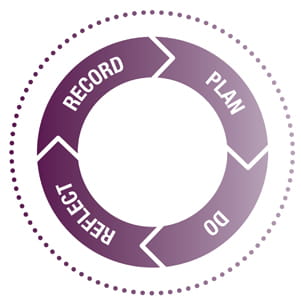
IN THE many conversations we had with dental professionals in developing our new enhanced continuing professional development (ECPD) system, we heard a plea for CPD to achieve much more than it has in recent years. This included recognising the importance of professionals driving their own development and learning, and how this responsibility relates to being a professional. We listened to what registrants felt would be a good fit for their developmental needs and applied this to how we formulated ECPD.
The new system was rolled out for dentists on 1 January this year and comes into effect for dental care professionals (DCPs) on 1 August. The experience dentists gain with ECPD between now and then will be incredibly valuable for the wider dental team, so I would really encourage the whole team to work together in the lead-up to the wider launch in August to ensure everyone is ready to embrace the changes.
NOT JUST COUNTING HOURS
ECPD introduces the first steps towards a more meaningful approach to professional development – a system that encourages professionals to prioritise the quality and relevance of learning activity rather than simply the number of hours required. It is also a system that works to better support professionals in their development, which focusses on building or maintaining the skills and knowledge required for everyday working lives.
Central to the new system is the introduction of the personal development plan (PDP). It’s designed to help professionals think about their current maintenance and development needs and the learning activities they will need to fulfil them. It also aims to provide a framework for professionals to reflect on their learning and how it applies to their work, whilst providing us – the regulator – with the assurance that CPD is being taken seriously and planned effectively by professionals.
We know that there are many professionals who already have a PDP in place, which is great because they’ll be ahead of the game. For everyone else, we have developed a template as a guide. It’s not compulsory to use the template, and for those with PDPs in place there’s no need to start from scratch. The one thing they will need to do though is incorporate the development outcomes, which is a new requirement.
FOCUS ON OUTCOMES
Professionals have told us they wanted their learning and development to be linked more closely to our Standards for the dental team and this is what the development outcomes introduce to CPD. They are a way of encouraging professionals to think more widely across the full breadth of what the standards cover, rather than a heavy focus on CPD that may contribute to clinical skills, for example.
All ECPD activity must now link each planned and completed activity to at least one development outcome. Below are development outcomes A, B, C, and D and some examples of what kinds of CPD activity might be linked to each. It is strongly encouraged, but not compulsory, to complete CPD linked to each of the outcomes.
A. Effective communication with patients, the dental team and others across dentistry, including when obtaining consent, dealing with complaints, and raising concerns when patients are at risk
- Communication skills
- Consent
- Complaints handling
- Raising concerns
- Safeguarding.
B. Effective management of self and effective management of others or effective work with others in the dental team, in the interests of patients; providing constructive leadership where appropriate
- Effective practice management
- Business management
- Team working
- Leadership skills.
C. Maintenance and development of knowledge and skill within your field of practice
- Clinical and technical areas of study
- Radiography
- Cross infection control
- Medical emergencies and CPR
- Emerging technologies and treatments
- CPD on quality assurance for MHRA
- CPD specific for your daily role(s).
D. Maintenance of skills, behaviours and attitudes which maintain patient confidence in you and the dental profession and put patients’ interests first
- Ethical and legal issues and developments
- Professional behaviours
- Equality and diversity training.
CHOOSING YOUR CPD
Whilst the GDC does not quality-assure CPD, it does place some requirements on CPD providers in order for courses to count as verifiable. One requirement is that evidence given to participants (i.e. the CPD certificate) must state that it has been subject to quality assurance and include the name of the person or body providing that quality assurance. In addition, the certificate should also feature the activity’s aims, objectives, learning content and the intended development outcomes covered. We have not been prescriptive in exactly the form this should take but these criteria should act as a guide in helping to decide if a course will meet the development needs professionals are looking for. It will also provide evidence that the CPD meets the GDC’s verifiable requirements.
While there is no approved list of training providers or courses, the ability of the CPD provider to demonstrate they are meeting the verifiable criteria can provide a good starting guide. Before booking a course though, professionals will need to have a good look at the course and use their professional judgement to decide if it will fulfil their development needs and will be counted as verifiable.
NEXT STEPS
ECPD represents significant progress on our journey towards creating a system that supports professional development in the best possible way, but it is not the final destination. As we look towards the future, we are seeking approaches to CPD that offer the professions more opportunity to take responsibility for development, and to achieve this in a way that complements what they are already doing.
This might, for example, mean a greater focus on peer-topeer development like mentoring, coaching and peer review activities. These new approaches will, however, only work if the opportunities on offer are seized. I encourage the whole profession to embrace these first steps and work with us in deciding how best to take these concepts forward.
I also encourage the whole team to work together to get the most from their CPD. In the meantime, there’s lots of information, hints and tips on the GDC website.
Jessica Rothnie is a policy manager at the General Dental Council and developed the enhanced CPD guidance documents for dental professionals
ECPD – KEY CHANGES
- Requirement for all dental professionals to have a personal development plan (PDP)
- Increase in the number of verifiable hours for most professional titles and the requirement to spread the hours more evenly across the five-year cycle
- Dental professionals no longer have to declare nonverifiable CPD to the GDC
- Requirement to make an annual statement of CPD hours completed, even if zero hours have been completed for that year • Requirement to align CPD activity with specific development outcomes
- Professionals must plan CPD activity according to their individual “field(s) of practice”
TOP TIPS
- Your personal development plan is meant to help you plan your CPD – don’t leave it until the last minute. Develop your PDP now and it will help you book the best CPD to match your personal development needs
- Before selecting (and paying for) CPD, make sure it meets the requirements laid out by the GDC
- The GDC has provided recommended topics to cover as part of its guidance but your main focus should be your field of practice – think about your daily work and use your professional judgement to decide whether the CPD fulfils your development needs
This page was correct at the time of publication. Any guidance is intended as general guidance for members only. If you are a member and need specific advice relating to your own circumstances, please contact one of our advisers.
Read more from this issue of Insight

Save this article
Save this article to a list of favourite articles which members can access in their account.
Save to library